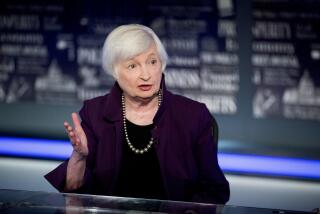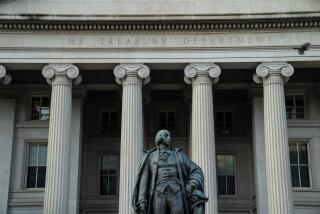Japan’s Cabinet OKs More Spending
- Share via
TOKYO — Japan’s Cabinet on Monday approved an extra dose of spending to stop a slide into recession, but the move was overshadowed by the latest no-confidence vote on the economy by an international rating agency.
The second extra budget, totalling $20.1 billion in government outlays, follows a $24.1 billion package enacted less than two weeks ago and casts fresh doubt on Prime Minister Junichiro Koizumi’s pledge to rein in the nation’s huge public debt.
Reflecting this, international credit rating agency Fitch cut its sovereign rating for Japan while Standard & Poor’s Corp. warned of a possible two-notch cut in Japan’s credit rating following its last downgrade in February.
The S&P; warning sent the yen down briefly against the dollar to 124.29 from 124.06 and added pressure on an already-weak government debt market, pushing the yield on 10-year government bonds to 1.370%, a one-month high.
“Japan’s credit fundamentals continue to deteriorate. The world recession has robbed the economy of its only bright spots in recent years--exports and high-tech investment,” Fitch said.
Fitch’s managing director of Japan, Sadateru Nishiura, said Japan’s rating would remain under pressure unless progress in economic reform and debt consolidation was seen.
But the stock market pushed higher to end at a three-month peak as investors focused on recent strength on Wall Street and took heart from signs that Japan’s troubled banks may be getting serious about cleaning up mountains of nonperforming loans.
Several top Japanese banks on Monday drastically increased their provisions against risky debt and scaled down their full-year earnings forecasts, suggesting they were knuckling down to solving their bad-loan problems.
The nation’s two biggest banking groups, Mizuho Holdings and Sumitomo Mitsui Banking Corp., both doubled their loan-loss charge estimates for the year and forecast a slide into the red.
The third-biggest, Mitsubishi Tokyo Financial Group, became only the second top-eight bank to expect to squeeze out a profit for the full year to March 2002, but it, too, saw bleak times ahead.
Asahi Bank, which plans to join a holding company led by Daiwa Bank by March 2002, said it planned to book $3.22 billion in bad loan charges for the business year.
“It’s not as if the banks are doing enough, but so far they have done more than the market was expecting,” said Masatoshi Sato, manager of the equity division at Mizuho Investor Securities.
Economics Minister Heizo Takenaka said the new government spending, which along with outlays from local governments will fund projects totalling $32.1 billion, would tack an extra 1 percentage point on to full-year GDP and was aimed at preventing the economy from falling into a deflationary spiral.
More to Read
Inside the business of entertainment
The Wide Shot brings you news, analysis and insights on everything from streaming wars to production — and what it all means for the future.
You may occasionally receive promotional content from the Los Angeles Times.










